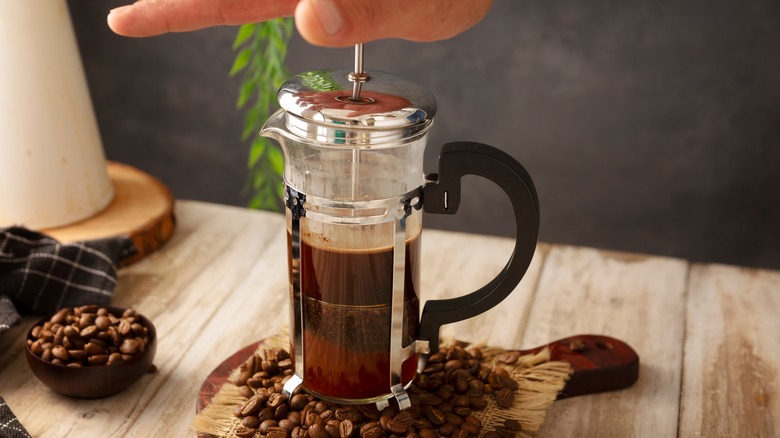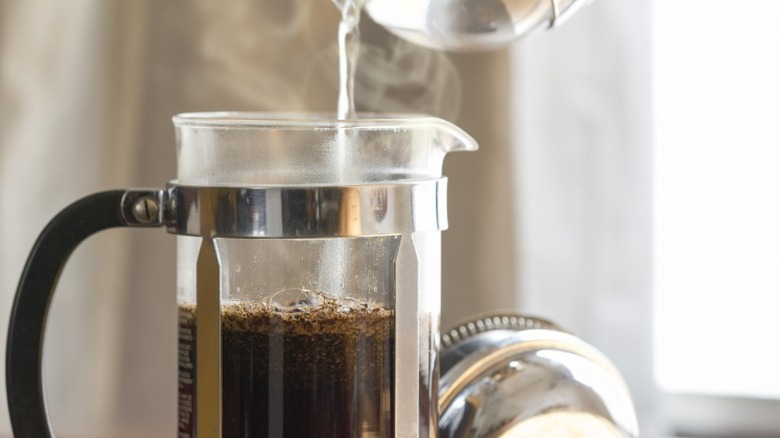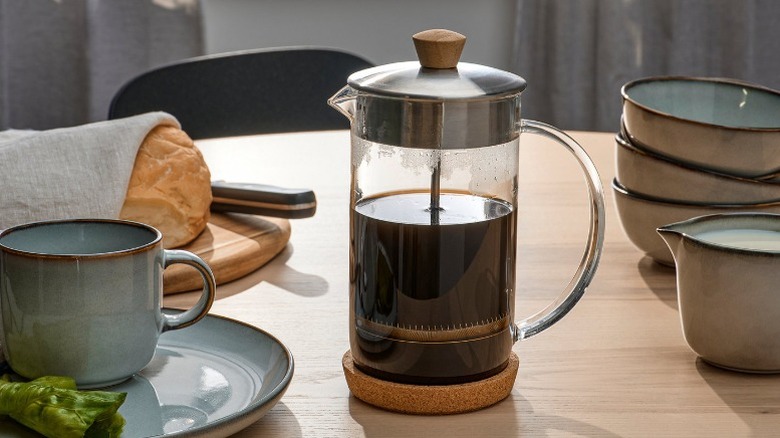What To Consider Before Buying Your First French Press
We may receive a commission on purchases made from links.
A French press is a pretty simple coffee-making gadget, but it's surprisingly versatile since you can use it to whip cream (if you've got the necessary stamina) or to de-pulp fruit juice if you ever misplace your strainer. Assuming you'll be using the French press to make coffee, though, what should you look for when making a purchase? According to Muhammad Saqlain, the coffee roaster behind the Toronto coffee delivery service RoastPlan, one major factor is the material it's made from.
The usual French press selection will include carafes made from glass, plastic, or metal. "Glass will give you a clean tasting finish and will give you a transparent view which might be aesthetically appealing," Saqlain told The Takeout. "Plastic is nice because it absorbs very little heat from the water and will allow the heat to focus on extracting the coffee. And finally stainless steel, which is more durable and can come with thermal insulation properties, which might be desirable." He owns options one and three, explaining, "I avoid plastic due to the mix of microplastics."
Saqlain also advises taking a look at the size of the filtering screen — smaller is better. As he warned, "Choosing a French press with a relatively larger screen size will result in smaller particles escaping the filter and making their way into your coffee."
The size of a French press matters
Something else you'll want to take into account when buying a French press is how large a cup of coffee you want it to brew as well as how many cups you plan to brew at a time. "Typically, you'll be using 15 grams of coffee for one brew that will yield about 250 grams," says Saqlain. (If you're not fluent in metric, that translates to about one tablespoon and nine ounces, respectively.) Even the smallest French presses should accommodate that amount. But if you'll be making multiple cups, you might need a press that accommodates a quart or more.
Yet another thing to keep in mind is how quickly you'll be drinking the coffee you brew. While no French press has a "keep warm" setting like an automatic coffee machine, Saqlain had another recommendation. "If you plan on brewing lots of coffee at once and drinking it over an extended period, then I'd suggest a thermally insulated French press that will retain its heat over longer times," he said. "Avoid brewing lots of coffee and having to reheat it up later, as that will add bitterness to the coffee for later cups."
Which French press should you pick?
Martha Stewart's favorite coffee-making gadget is the $40 Bodum French press. Her being a multimillionaire and all, it's kind of surprising she's not endorsing an ultra-luxe, gold-plated model priced like a late-model car. Saqlain, however, has an even less expensive recommendation for a first French press. "My suggestion is: Ikea 365+ French press coffee maker. ... It looks great, functions great, and is very inexpensive to start with." It sells for around $20, but Ikea also offers a similarly-sized French press priced at $15 and a smaller one costing only $10. The main difference between Saqlain's pick and the Upphetta models I mentioned is the latter two have black plastic fittings while the former are made of metal and cork (all three are glass).
Saqlain admitted that French presses can be hard to clean, but offered an alternate suggestion if this is a deal breaker: the Hario Switch immersion dripper. Saqlain described it as "a hybrid between immersion brewing and percolation ... The way it works is that there's a valve at the bottom of the brewer that will block water or coffee from dripping. You can simply switch that valve on, place a filter, load your coffee, pour your water, let it steep, and then drain it into your cup. Once done, you simply lift the filter with the grounds and dispose of it." The result, he said, is "a cup of coffee brewed very similarly to a French press, with the advantage of a cleaner cup that is filtered using the filter, and minimal cleanup."


